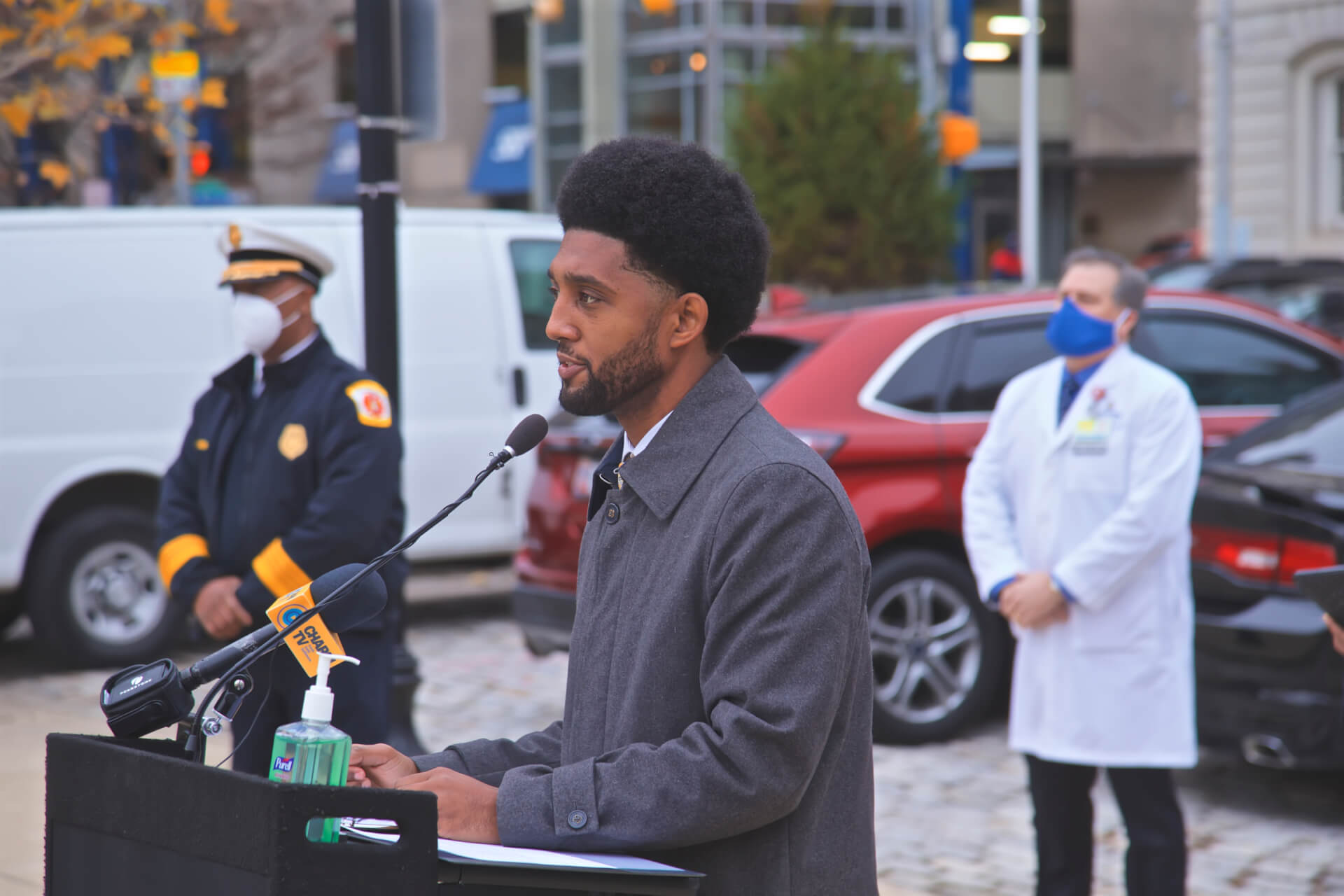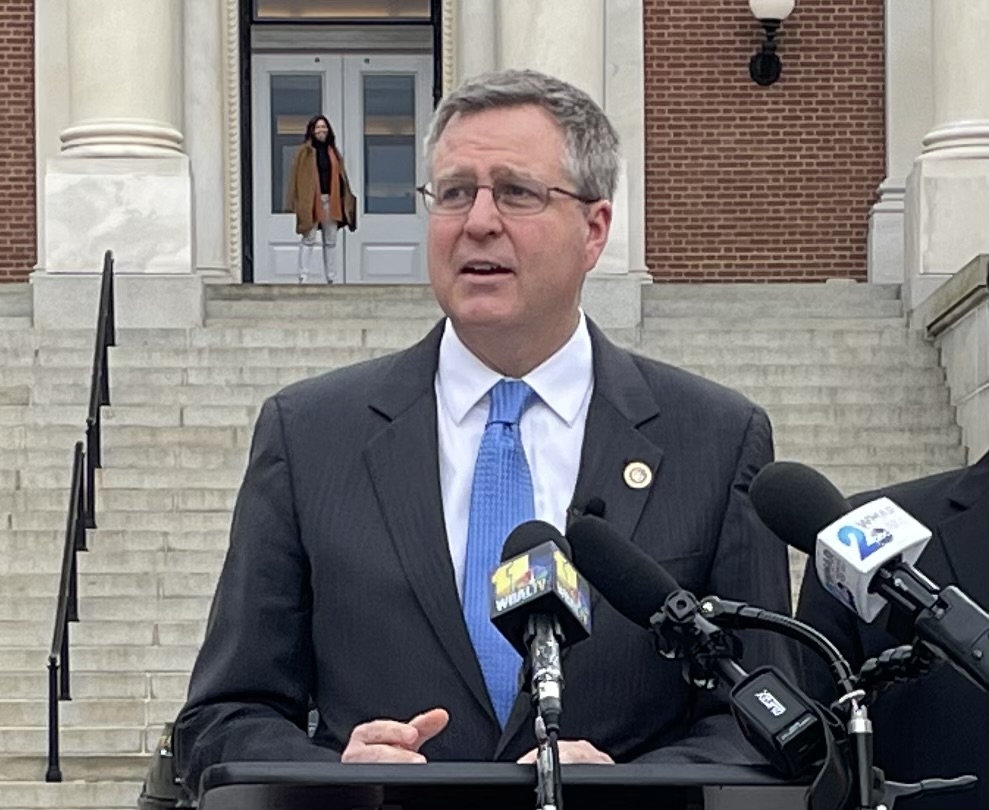
Mayor Brandon Scott admits it’s often difficult to get a full night’s rest. One year after being sworn in as Baltimore’s 52nd mayor, Scott is coping with a city which has experienced more than 300 homicides for the seventh straight year.
That includes the horrific murder of 69-year-old Evelyn Player inside an East Baltimore church where she was a volunteer. 62-year-old Manzie Smith Jr., who has a lengthy record of violent crimes, has been charged with Player’s murder.
Then, there was the fatal shooting of 13-year-old Maliyah Turner outside a recreation center in West Baltimore. That night, Scott tweeted: “Evil will not prevail or continue to cast a dark shadow over the light of our young people — I will not allow it.”
In an interview with Maryland Matters, Scott said: “We know what keeps me up at night: that we lose too many people to overdose, to COVID and to violence.”
During the 2020 mayoral campaign, Scott vowed to “reduce homicides by 15% each year in my term, getting us to below 300 homicides in my first year as mayor.”
The mayor acknowledges that goal was not met. While the number of non-fatal shootings is about the same from last year at this time, the number of homicides is up by at least 10. The city passed the grim milestone of more than 300 homicides last month.
On the anniversary of his first year in office Wednesday, Scott delivered a virtual speech from City Hall, in which he outlined his long-term action plan for reducing violence and a comprehensive strategy for improving the quality of life in Baltimore.
“To make progress, we have to set ambitious goals and work every day to achieve them,” he said.
The mayor said he plans to meet with Governor Lawrence J. Hogan Jr. (R) in the next couple of weeks to update him on public safety initiatives. Scott says he is also seeking a better partnership with the state. Baltimore City just received a $9 million state grant to expand public safety initiatives, including more police foot patrols.
Other initiatives, including the “Hire Up” program, will provide temporary jobs to 220 low-income residents, paying $15 an hour.
Just days after taking office, Scott re-imposed an indoor mask mandate on businesses and restaurants, as cases of COVID-19 continued to soar. The mandate was eventually lifted in July but reinstated one month later. In October, the mayor announced he had contracted the virus and self-quarantined for 10 days. However Scott said that because he had been vaccinated, his symptoms were minor.
About 360,000 city residents have received at least one vaccine. The mayor has imposed a vaccine mandate for city workers by Jan. 14, 2022. Employees who are not fully vaccinated by then must submit to weekly testing. This week, Scott announced that all fully vaccinated city employees will receive $1,000. The city is utilizing funds from the American Rescue Plan Act to pay for the incentive program.
Scott says he expects to see tangible results from his 90-day squeegee action plan.
“Seeing such a large number of young people on corners illustrates our failures as a city,” Scott said. “It’s crucial that we look at this as a public health matter, look at the underlying factors that cause these young people to squeegee and provide wrap-around services to give them the support they need.”
But the mayor bristled at recent comments on WBAL Radio about squeegee workers made by James Brochin, a former Baltimore County state senator and unsuccessful Democratic candidate for county executive in 2018. During a talk show, Brochin suggested county residents boycott the city until squeegee workers are cleared from major intersections.
“Thank God, the citizens of Baltimore County were smart enough to not elect a gas-lighting racist like Jim Brochin” Scott said.
In an op-ed piece published in the Baltimore Sun, Brochin flatly denied his comments were racist. He wrote: “Squeegee kids are part of an endemic failure of city leaders to fix their own problem.”
The mayor also weighed in on calls to remove members of an advisory board which oversees the Baltimore Inspector General’s Office. The board includes several public officials, including City Council President Nick J. Mosby (D) and City Solicitor Jim Shea, who is appointed by the mayor. Critics say any members who could potentially be investigated by Inspector General Isabel Cumming, should be removed from the advisory board. But a change in the board’s membership would require a change in the city charter.
“The citizens of Baltimore overwhelmingly voted for this board to be this way. The inspector general herself testified in support of this piece of legislation, and my job was to put together the board as the charter lays out,” Scott said. “The inspector general and I have no ill will toward each other.”
“The report [by the advisory board] said she was doing a great job. For me, it’s about allowing her to do her job and hold people accountable and having the board do its job – as approved by city voters.”
As 2022 approaches, Scott says he remains optimistic about improving the quality of life in the city.
“This is much deeper than one thing. This is about how Baltimore and its government in its entirety can be better for the future.”
John Rydell has covered state politics for more than 30 years with WBFF-TV and Maryland Public Television. He can be reached at [email protected].




 Creative Commons Attribution
Creative Commons Attribution